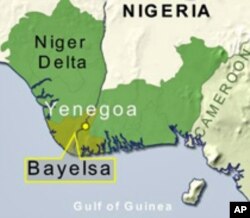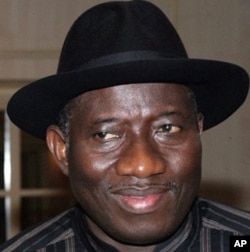Vice President Goodluck Jonathan has assumed the reins of power as Nigeria's acting leader. With the prolonged absence of President Umaru Yar’Adua, who is receiving treatment for heart and kidney conditions in Saudi Arabia, Mr. Jonathan won recognition from Nigeria’s cabinet to realize the formal transfer of power, after receiving approval from both houses of Nigeria’s national assembly on Tuesday.
Some lawmakers continue to question whether parliament’s approval of motions for the succession is constitutional. Political science Professor Sadiq Abubakar of the Ahmadou Bello University in Kaduna State observes that regardless of the outcome of a potential legal battle, parliament’s approval of the transfer is occurring under the most uncommon of circumstances.
“They have the constitutional right to remove the president, to impeach him. They didn’t do that. So they depended on the motions of the two houses, citing first what is called the Doctrine of Necessity. They should have gone to court to actually give declaration of this Doctrine of Necessity, a situation which is not foreseen by the constitution, and which has given way to a vacuum,” he advised.
Professor Abubakar says that since so much power has been concentrated around the influence of African presidents, Nigerian cabinet ministers have been very reluctant to take the initiative to advise President Yar’Adua of his responsibility to relinquish power, given the frailty of his condition, which has kept him hospitalized far away from Nigeria for almost an unprecedented four months.
“Men of honor, ministers are supposed to advise the president, to tell him the right thing, and nobody was willing to do that,” said Abubakar.
Ultimately, it was Information Minister Dora Akunyili, who announced cabinet ministers’ acceptance of the National Assembly’s decision and pledged the cabinet’s support to Mr. Jonathan. While admitting that if the Nigerian judiciary gets involved with an intention to reverse the transition, Professor Abubakar says they have the ability to act swiftly, but he does not think they will do so.
“Nigerians judicially have not actually performed creditably in this matter. They give all sorts of conflicting statements with room for all sorts of rumors. People begin to say that ‘they are in their pockets of some people who are very close to the seat of power, who want the state to remain the way it has been’,” he notes.
On the other hand, Abubakar credits Mr. Jonathan, who had been seen as an unassertive southern governor of Bayelsa State three years ago when he was selected as President Yar’Adua’s running mate, for pursuing an effective transition that is designed to convince Nigeria’s public that his leadership should be taken seriously.
“My reading of what President Jonathan has done, the cabinet reshuffle which he has made, indicates to me that he thinks that President Yar’Adua cannot come back to assume the reins of power…He did what he did in order to tell Nigerians that ‘I’m in charge. I’m now the lord of the manor.’ And he had to do that in order to show people that there’s no fighting in the country, there’s an acting president, and that he’s ready to run the country,” he said.
One of Goodluck Jonathan’s first moves as President was to replace an unpopular justice minister, Michael Aondoakaa, and demote him to a relatively insignificant post of minister of special duties. The Ahmadou Bello University professor says that Jonathan has given Nigerians every indication that he is here to stay in power, even with the impending return home by the country’s reclusive, but recovering president.






